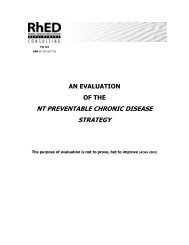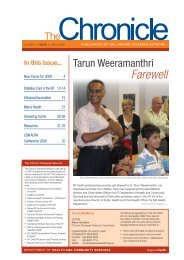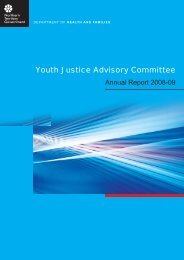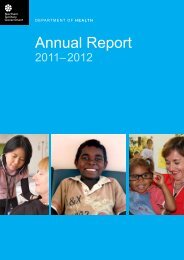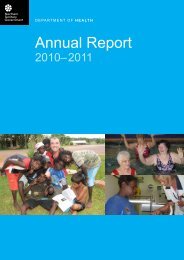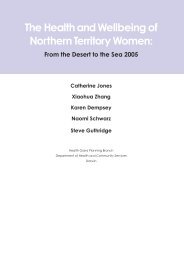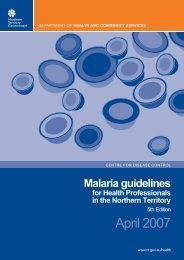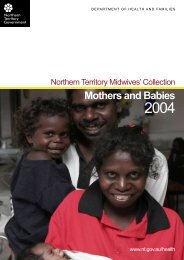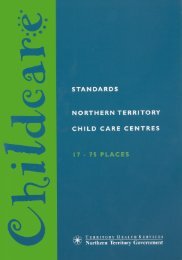DHF Annual Report 2009 - NT Health Digital Library - Northern ...
DHF Annual Report 2009 - NT Health Digital Library - Northern ...
DHF Annual Report 2009 - NT Health Digital Library - Northern ...
You also want an ePaper? Increase the reach of your titles
YUMPU automatically turns print PDFs into web optimized ePapers that Google loves.
<strong>Health</strong> Promotion Strategy Unit (HPSU)The role of the HPSU is to lead the continuous quality improvement of health promotionpractice. HPSU: provides the expertise, tools and resources to equip and support staff to design, develop, provides specialist advice to support the integration of health promotion in health implements workforce development strategies to improve the skills, knowledge andKey AchievementsThe uptake of the Quality Improvement Program Planning System (QIPPS) continues togrow, with more staff across the Department of <strong>Health</strong> and Families now using QIPPSto plan health promotion action. The Departmental workforce continue to be providedsupport in the use of QIPPS with training programs facilitated by the HPSU held inDarwin, Alice Springs, Nhulunbuy and Katherine over the year. Further support andtraining, often on a one-to-one basis, is provided by the <strong>Health</strong> Promotion Strategy Unit.The HPSU facilitated education in the use of <strong>Health</strong> Impact Assessment in Darwin andAlice Springs. The HPSU was successful in gaining funding for this education programunder the Allied <strong>Health</strong> Professional Development Funding Program.The HPSU along with other branches in the Department, has worked closely with theSchool of <strong>Health</strong> Sciences at Charles Darwin University to support the development andimplementation of a Bachelor of <strong>Health</strong> Sciences in 2011. This undergraduate programwill offer four majors including one in health promotion.to the HPSU under the Commonwealth Productivity Places Program.Remote <strong>Health</strong>The goal of the Remote <strong>Health</strong> Branch is to ensure that evidence-based, best practiceprimary health care services are delivered to the remote population throughout the<strong>Northern</strong> Territory. Services are delivered through Departmental remote health centres,non-government organisations (some funded by the Department) and independentcommunity-controlled health organisations.Services include the provision of 24-hour emergency care, primary clinical care, populationhealth programs, referral and access to retrieval, medical and allied health specialistservices, provision of essential medications and management of chronic illness. Servicesare delivered by multidisciplinary health teams at remote health centres located throughoutthe Territory.Around 90% of all consultations and health contacts at remote health centres are withAboriginal people. However, services are equally accessible to non-Aboriginal residentsand non-residents, such as tourists.Most of the remote population serviced by the branch is Aboriginal, relatively young, highlymobile and widely dispersed. These people have relatively low levels of literacy in English, arelatively high burden of illness and injury and high rates of complex chronic co-morbiditiesand infectious disease.132Department <strong>Health</strong> and Families



